Analyzing Ethical Issues in Withdrawal of Medical Treatment
VerifiedAdded on 2023/06/10
|10
|3475
|191
Essay
AI Summary
This essay delves into the multifaceted aspects of withdrawing medical treatment, emphasizing the ethical considerations, patient rights, and the decision-making processes involved. It begins by highlighting the necessity of drug withdrawal treatment in cases of dependency and addiction, outlining the advantages such as counselling, support, and improved health. The essay further elaborates on individual patient rights, including the right to information, consent, medical care, equity, and safety, underscoring the importance of respecting these rights throughout the treatment process. It addresses the potential consequences of withdrawal treatment in diverse populations, acknowledging cultural beliefs and patient preferences, and proposes approaches to resolve ethical dilemmas using utilitarian, impartial, and morally sound strategies. The essay also examines the ethical and professional principles that influence decision-making, such as autonomy, beneficence, non-maleficence, and justice, and explores how personal values and morals can be integrated into professional practices to ensure patient-centered care. The study concludes by reinforcing the significance of ethical considerations in healthcare and advocating for a balanced approach that respects patient autonomy while upholding professional standards.
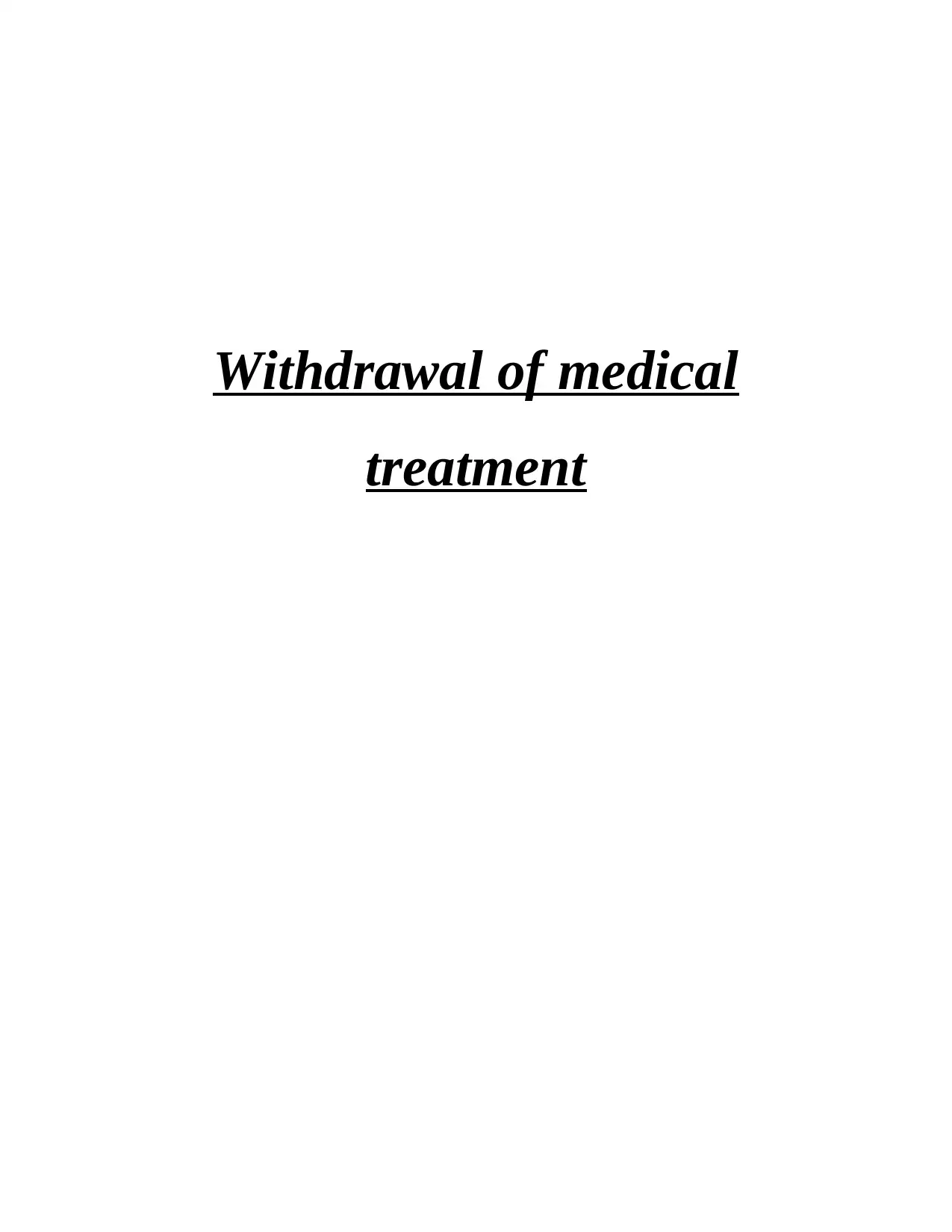
Withdrawal of medical
treatment
treatment
Paraphrase This Document
Need a fresh take? Get an instant paraphrase of this document with our AI Paraphraser
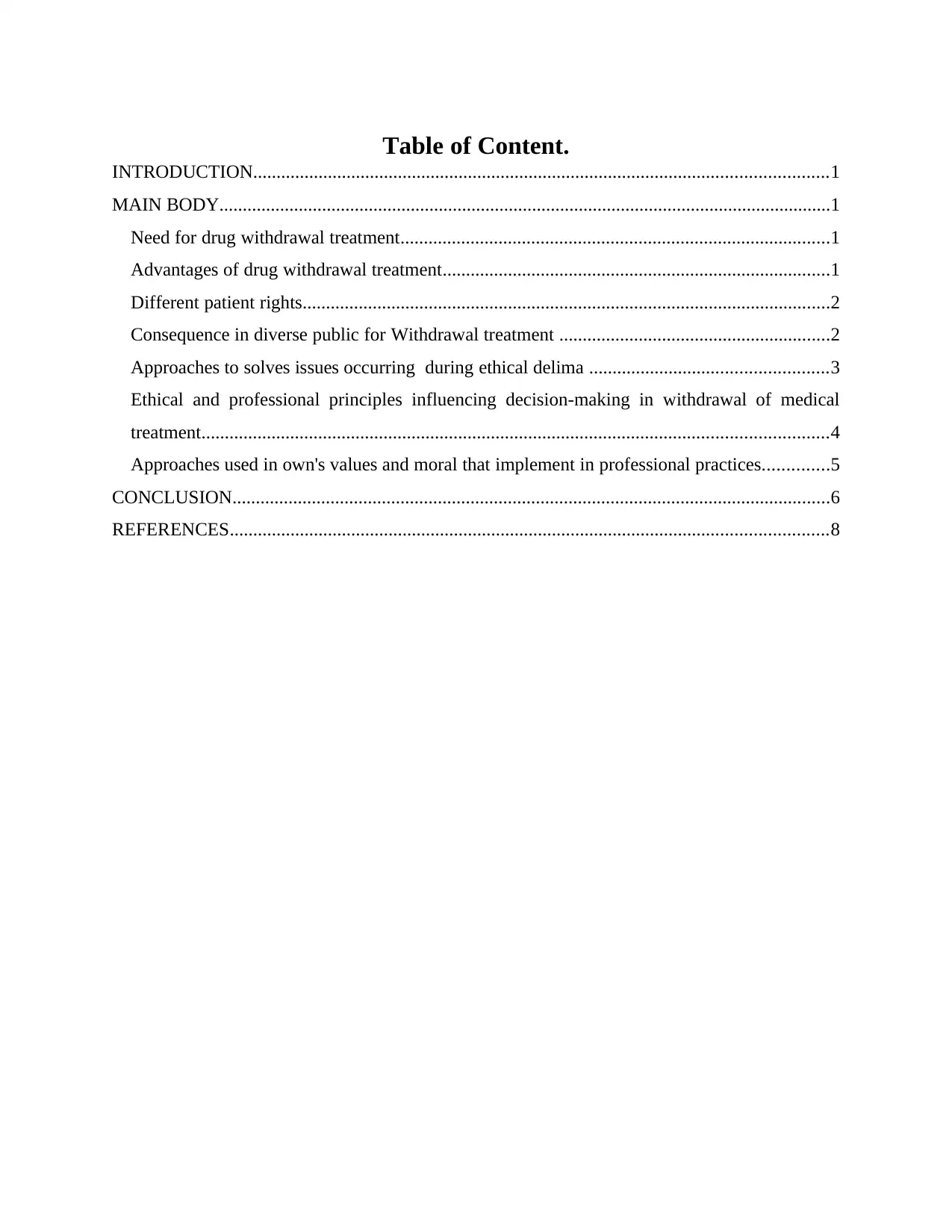
Table of Content.
INTRODUCTION...........................................................................................................................1
MAIN BODY...................................................................................................................................1
Need for drug withdrawal treatment............................................................................................1
Advantages of drug withdrawal treatment...................................................................................1
Different patient rights.................................................................................................................2
Consequence in diverse public for Withdrawal treatment ..........................................................2
Approaches to solves issues occurring during ethical delima ...................................................3
Ethical and professional principles influencing decision-making in withdrawal of medical
treatment......................................................................................................................................4
Approaches used in own's values and moral that implement in professional practices..............5
CONCLUSION................................................................................................................................6
REFERENCES................................................................................................................................8
INTRODUCTION...........................................................................................................................1
MAIN BODY...................................................................................................................................1
Need for drug withdrawal treatment............................................................................................1
Advantages of drug withdrawal treatment...................................................................................1
Different patient rights.................................................................................................................2
Consequence in diverse public for Withdrawal treatment ..........................................................2
Approaches to solves issues occurring during ethical delima ...................................................3
Ethical and professional principles influencing decision-making in withdrawal of medical
treatment......................................................................................................................................4
Approaches used in own's values and moral that implement in professional practices..............5
CONCLUSION................................................................................................................................6
REFERENCES................................................................................................................................8
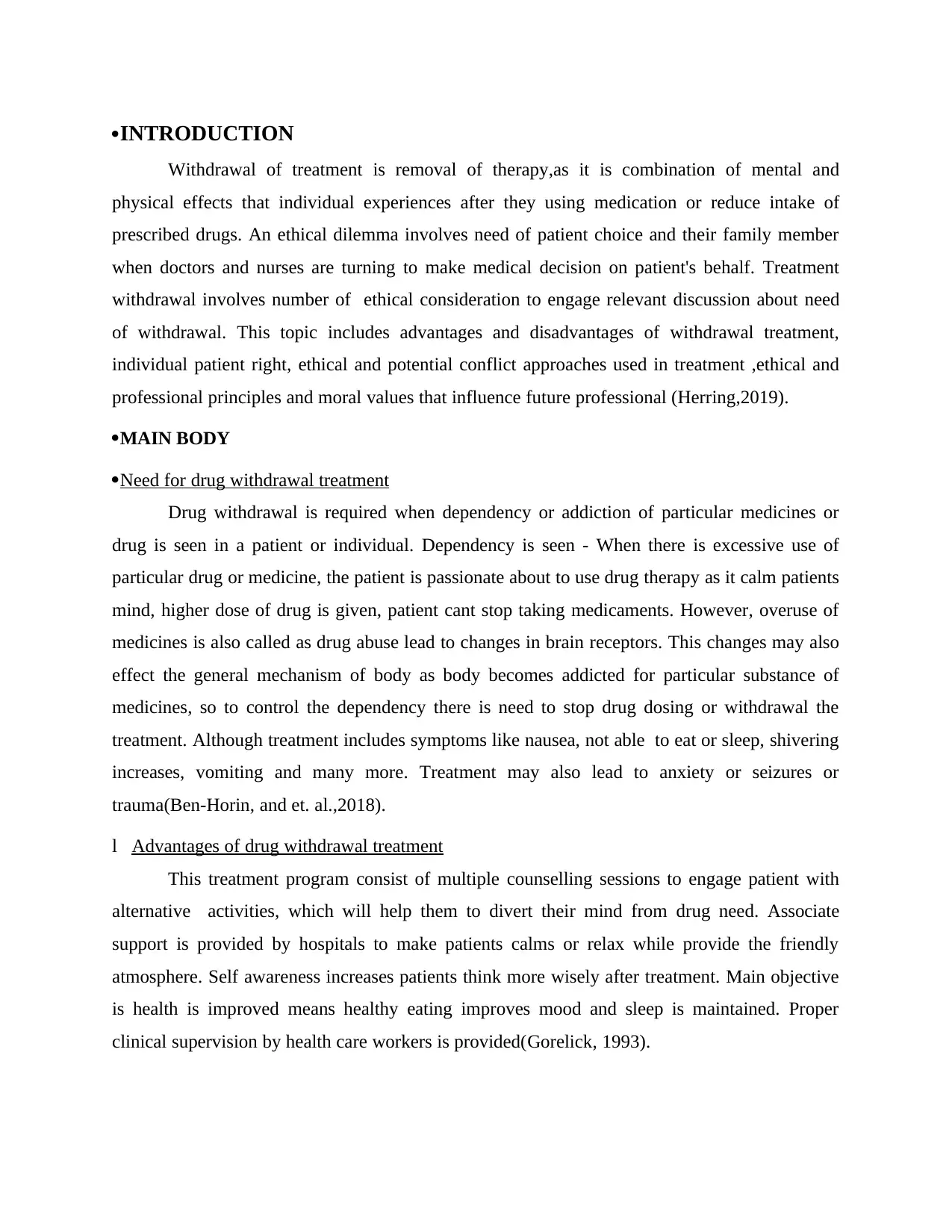
·INTRODUCTION
Withdrawal of treatment is removal of therapy,as it is combination of mental and
physical effects that individual experiences after they using medication or reduce intake of
prescribed drugs. An ethical dilemma involves need of patient choice and their family member
when doctors and nurses are turning to make medical decision on patient's behalf. Treatment
withdrawal involves number of ethical consideration to engage relevant discussion about need
of withdrawal. This topic includes advantages and disadvantages of withdrawal treatment,
individual patient right, ethical and potential conflict approaches used in treatment ,ethical and
professional principles and moral values that influence future professional (Herring,2019).
·MAIN BODY
·Need for drug withdrawal treatment
Drug withdrawal is required when dependency or addiction of particular medicines or
drug is seen in a patient or individual. Dependency is seen - When there is excessive use of
particular drug or medicine, the patient is passionate about to use drug therapy as it calm patients
mind, higher dose of drug is given, patient cant stop taking medicaments. However, overuse of
medicines is also called as drug abuse lead to changes in brain receptors. This changes may also
effect the general mechanism of body as body becomes addicted for particular substance of
medicines, so to control the dependency there is need to stop drug dosing or withdrawal the
treatment. Although treatment includes symptoms like nausea, not able to eat or sleep, shivering
increases, vomiting and many more. Treatment may also lead to anxiety or seizures or
trauma(Ben-Horin, and et. al.,2018).
l壱Advantages of drug withdrawal treatment
This treatment program consist of multiple counselling sessions to engage patient with
alternative activities, which will help them to divert their mind from drug need. Associate
support is provided by hospitals to make patients calms or relax while provide the friendly
atmosphere. Self awareness increases patients think more wisely after treatment. Main objective
is health is improved means healthy eating improves mood and sleep is maintained. Proper
clinical supervision by health care workers is provided(Gorelick, 1993).
Withdrawal of treatment is removal of therapy,as it is combination of mental and
physical effects that individual experiences after they using medication or reduce intake of
prescribed drugs. An ethical dilemma involves need of patient choice and their family member
when doctors and nurses are turning to make medical decision on patient's behalf. Treatment
withdrawal involves number of ethical consideration to engage relevant discussion about need
of withdrawal. This topic includes advantages and disadvantages of withdrawal treatment,
individual patient right, ethical and potential conflict approaches used in treatment ,ethical and
professional principles and moral values that influence future professional (Herring,2019).
·MAIN BODY
·Need for drug withdrawal treatment
Drug withdrawal is required when dependency or addiction of particular medicines or
drug is seen in a patient or individual. Dependency is seen - When there is excessive use of
particular drug or medicine, the patient is passionate about to use drug therapy as it calm patients
mind, higher dose of drug is given, patient cant stop taking medicaments. However, overuse of
medicines is also called as drug abuse lead to changes in brain receptors. This changes may also
effect the general mechanism of body as body becomes addicted for particular substance of
medicines, so to control the dependency there is need to stop drug dosing or withdrawal the
treatment. Although treatment includes symptoms like nausea, not able to eat or sleep, shivering
increases, vomiting and many more. Treatment may also lead to anxiety or seizures or
trauma(Ben-Horin, and et. al.,2018).
l壱Advantages of drug withdrawal treatment
This treatment program consist of multiple counselling sessions to engage patient with
alternative activities, which will help them to divert their mind from drug need. Associate
support is provided by hospitals to make patients calms or relax while provide the friendly
atmosphere. Self awareness increases patients think more wisely after treatment. Main objective
is health is improved means healthy eating improves mood and sleep is maintained. Proper
clinical supervision by health care workers is provided(Gorelick, 1993).
⊘ This is a preview!⊘
Do you want full access?
Subscribe today to unlock all pages.

Trusted by 1+ million students worldwide
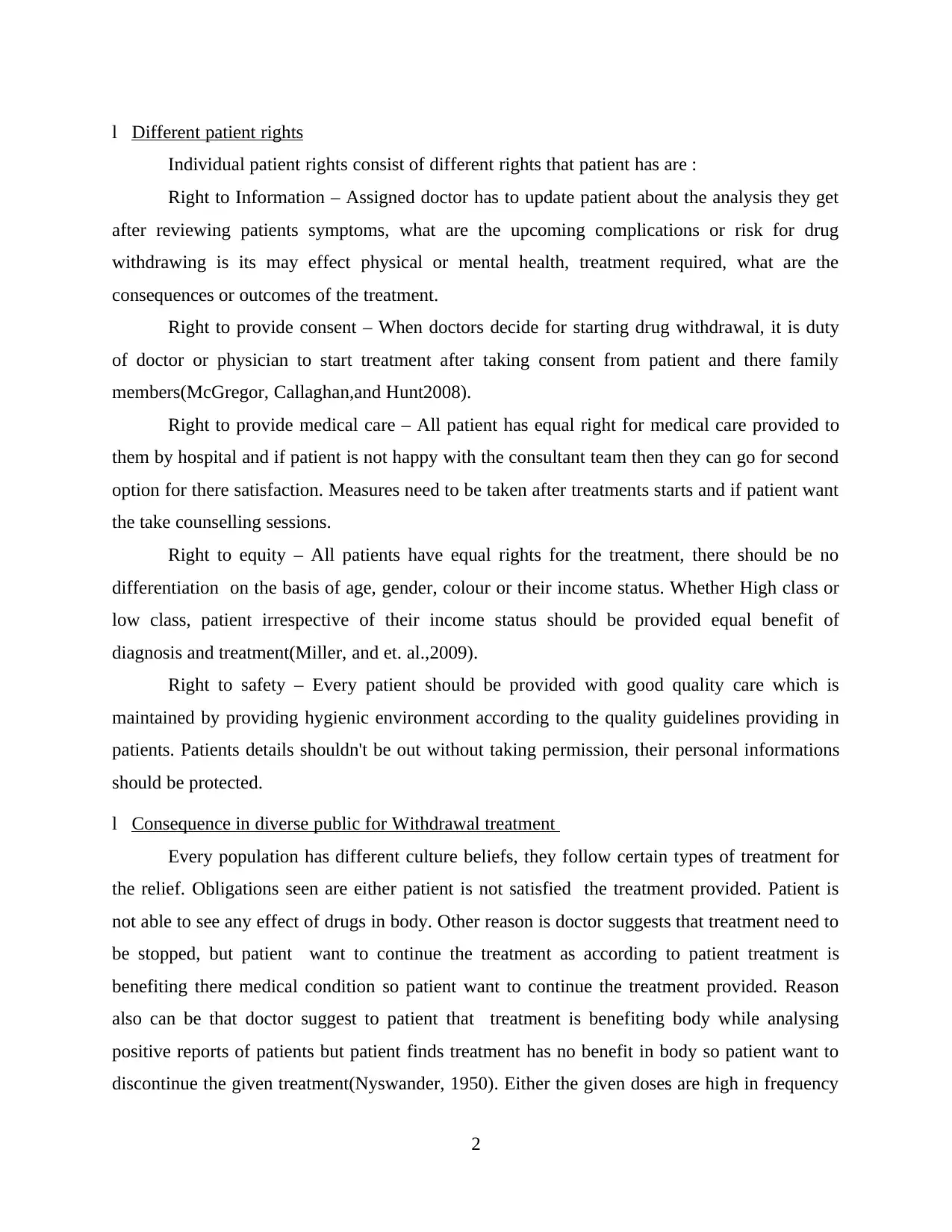
l壱Different patient rights
Individual patient rights consist of different rights that patient has are :
Right to Information – Assigned doctor has to update patient about the analysis they get
after reviewing patients symptoms, what are the upcoming complications or risk for drug
withdrawing is its may effect physical or mental health, treatment required, what are the
consequences or outcomes of the treatment.
Right to provide consent – When doctors decide for starting drug withdrawal, it is duty
of doctor or physician to start treatment after taking consent from patient and there family
members(McGregor, Callaghan,and Hunt2008).
Right to provide medical care – All patient has equal right for medical care provided to
them by hospital and if patient is not happy with the consultant team then they can go for second
option for there satisfaction. Measures need to be taken after treatments starts and if patient want
the take counselling sessions.
Right to equity – All patients have equal rights for the treatment, there should be no
differentiation on the basis of age, gender, colour or their income status. Whether High class or
low class, patient irrespective of their income status should be provided equal benefit of
diagnosis and treatment(Miller, and et. al.,2009).
Right to safety – Every patient should be provided with good quality care which is
maintained by providing hygienic environment according to the quality guidelines providing in
patients. Patients details shouldn't be out without taking permission, their personal informations
should be protected.
l壱Consequence in diverse public for Withdrawal treatment
Every population has different culture beliefs, they follow certain types of treatment for
the relief. Obligations seen are either patient is not satisfied the treatment provided. Patient is
not able to see any effect of drugs in body. Other reason is doctor suggests that treatment need to
be stopped, but patient want to continue the treatment as according to patient treatment is
benefiting there medical condition so patient want to continue the treatment provided. Reason
also can be that doctor suggest to patient that treatment is benefiting body while analysing
positive reports of patients but patient finds treatment has no benefit in body so patient want to
discontinue the given treatment(Nyswander, 1950). Either the given doses are high in frequency
2
Individual patient rights consist of different rights that patient has are :
Right to Information – Assigned doctor has to update patient about the analysis they get
after reviewing patients symptoms, what are the upcoming complications or risk for drug
withdrawing is its may effect physical or mental health, treatment required, what are the
consequences or outcomes of the treatment.
Right to provide consent – When doctors decide for starting drug withdrawal, it is duty
of doctor or physician to start treatment after taking consent from patient and there family
members(McGregor, Callaghan,and Hunt2008).
Right to provide medical care – All patient has equal right for medical care provided to
them by hospital and if patient is not happy with the consultant team then they can go for second
option for there satisfaction. Measures need to be taken after treatments starts and if patient want
the take counselling sessions.
Right to equity – All patients have equal rights for the treatment, there should be no
differentiation on the basis of age, gender, colour or their income status. Whether High class or
low class, patient irrespective of their income status should be provided equal benefit of
diagnosis and treatment(Miller, and et. al.,2009).
Right to safety – Every patient should be provided with good quality care which is
maintained by providing hygienic environment according to the quality guidelines providing in
patients. Patients details shouldn't be out without taking permission, their personal informations
should be protected.
l壱Consequence in diverse public for Withdrawal treatment
Every population has different culture beliefs, they follow certain types of treatment for
the relief. Obligations seen are either patient is not satisfied the treatment provided. Patient is
not able to see any effect of drugs in body. Other reason is doctor suggests that treatment need to
be stopped, but patient want to continue the treatment as according to patient treatment is
benefiting there medical condition so patient want to continue the treatment provided. Reason
also can be that doctor suggest to patient that treatment is benefiting body while analysing
positive reports of patients but patient finds treatment has no benefit in body so patient want to
discontinue the given treatment(Nyswander, 1950). Either the given doses are high in frequency
2
Paraphrase This Document
Need a fresh take? Get an instant paraphrase of this document with our AI Paraphraser
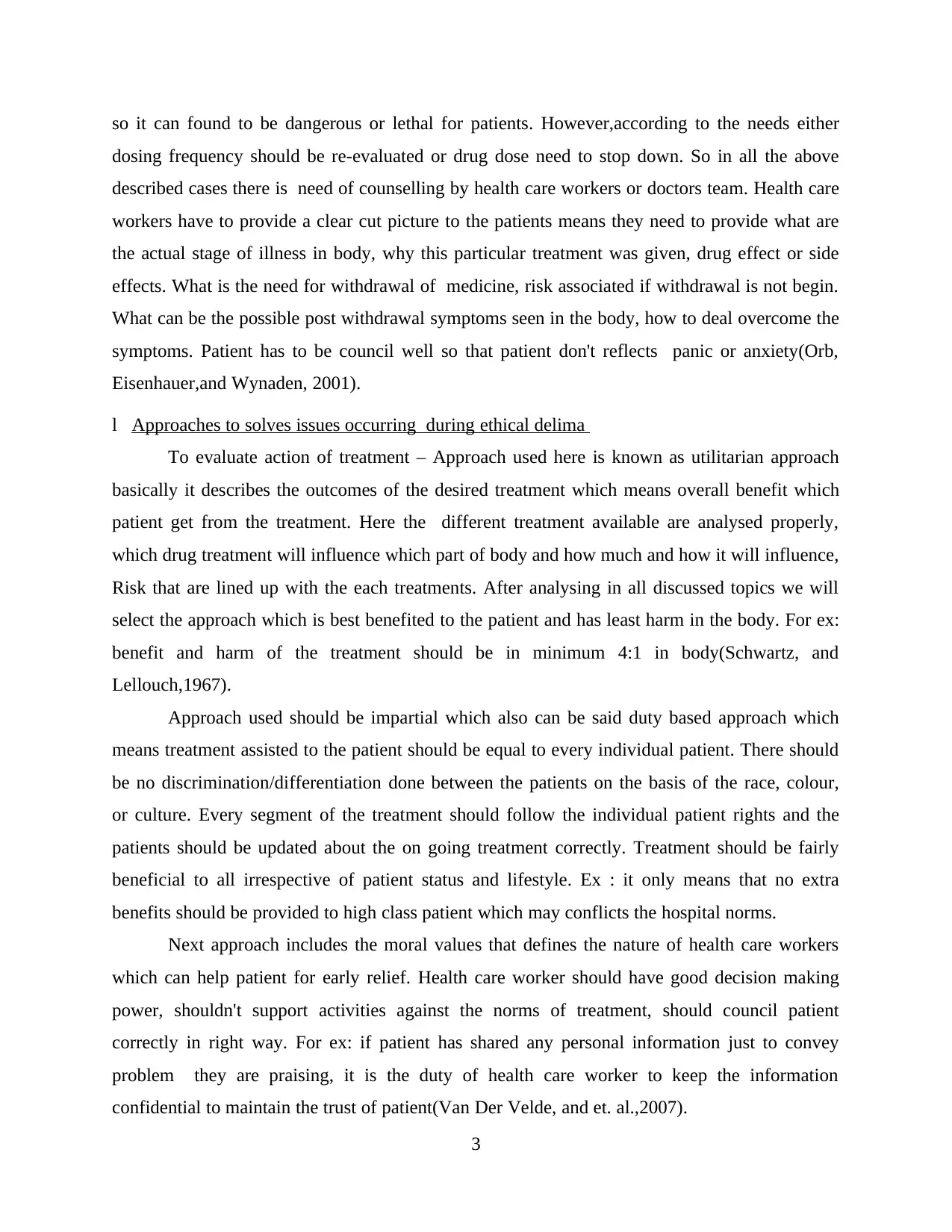
so it can found to be dangerous or lethal for patients. However,according to the needs either
dosing frequency should be re-evaluated or drug dose need to stop down. So in all the above
described cases there is need of counselling by health care workers or doctors team. Health care
workers have to provide a clear cut picture to the patients means they need to provide what are
the actual stage of illness in body, why this particular treatment was given, drug effect or side
effects. What is the need for withdrawal of medicine, risk associated if withdrawal is not begin.
What can be the possible post withdrawal symptoms seen in the body, how to deal overcome the
symptoms. Patient has to be council well so that patient don't reflects panic or anxiety(Orb,
Eisenhauer,and Wynaden, 2001).
l壱Approaches to solves issues occurring during ethical delima
To evaluate action of treatment – Approach used here is known as utilitarian approach
basically it describes the outcomes of the desired treatment which means overall benefit which
patient get from the treatment. Here the different treatment available are analysed properly,
which drug treatment will influence which part of body and how much and how it will influence,
Risk that are lined up with the each treatments. After analysing in all discussed topics we will
select the approach which is best benefited to the patient and has least harm in the body. For ex:
benefit and harm of the treatment should be in minimum 4:1 in body(Schwartz, and
Lellouch,1967).
Approach used should be impartial which also can be said duty based approach which
means treatment assisted to the patient should be equal to every individual patient. There should
be no discrimination/differentiation done between the patients on the basis of the race, colour,
or culture. Every segment of the treatment should follow the individual patient rights and the
patients should be updated about the on going treatment correctly. Treatment should be fairly
beneficial to all irrespective of patient status and lifestyle. Ex : it only means that no extra
benefits should be provided to high class patient which may conflicts the hospital norms.
Next approach includes the moral values that defines the nature of health care workers
which can help patient for early relief. Health care worker should have good decision making
power, shouldn't support activities against the norms of treatment, should council patient
correctly in right way. For ex: if patient has shared any personal information just to convey
problem they are praising, it is the duty of health care worker to keep the information
confidential to maintain the trust of patient(Van Der Velde, and et. al.,2007).
3
dosing frequency should be re-evaluated or drug dose need to stop down. So in all the above
described cases there is need of counselling by health care workers or doctors team. Health care
workers have to provide a clear cut picture to the patients means they need to provide what are
the actual stage of illness in body, why this particular treatment was given, drug effect or side
effects. What is the need for withdrawal of medicine, risk associated if withdrawal is not begin.
What can be the possible post withdrawal symptoms seen in the body, how to deal overcome the
symptoms. Patient has to be council well so that patient don't reflects panic or anxiety(Orb,
Eisenhauer,and Wynaden, 2001).
l壱Approaches to solves issues occurring during ethical delima
To evaluate action of treatment – Approach used here is known as utilitarian approach
basically it describes the outcomes of the desired treatment which means overall benefit which
patient get from the treatment. Here the different treatment available are analysed properly,
which drug treatment will influence which part of body and how much and how it will influence,
Risk that are lined up with the each treatments. After analysing in all discussed topics we will
select the approach which is best benefited to the patient and has least harm in the body. For ex:
benefit and harm of the treatment should be in minimum 4:1 in body(Schwartz, and
Lellouch,1967).
Approach used should be impartial which also can be said duty based approach which
means treatment assisted to the patient should be equal to every individual patient. There should
be no discrimination/differentiation done between the patients on the basis of the race, colour,
or culture. Every segment of the treatment should follow the individual patient rights and the
patients should be updated about the on going treatment correctly. Treatment should be fairly
beneficial to all irrespective of patient status and lifestyle. Ex : it only means that no extra
benefits should be provided to high class patient which may conflicts the hospital norms.
Next approach includes the moral values that defines the nature of health care workers
which can help patient for early relief. Health care worker should have good decision making
power, shouldn't support activities against the norms of treatment, should council patient
correctly in right way. For ex: if patient has shared any personal information just to convey
problem they are praising, it is the duty of health care worker to keep the information
confidential to maintain the trust of patient(Van Der Velde, and et. al.,2007).
3
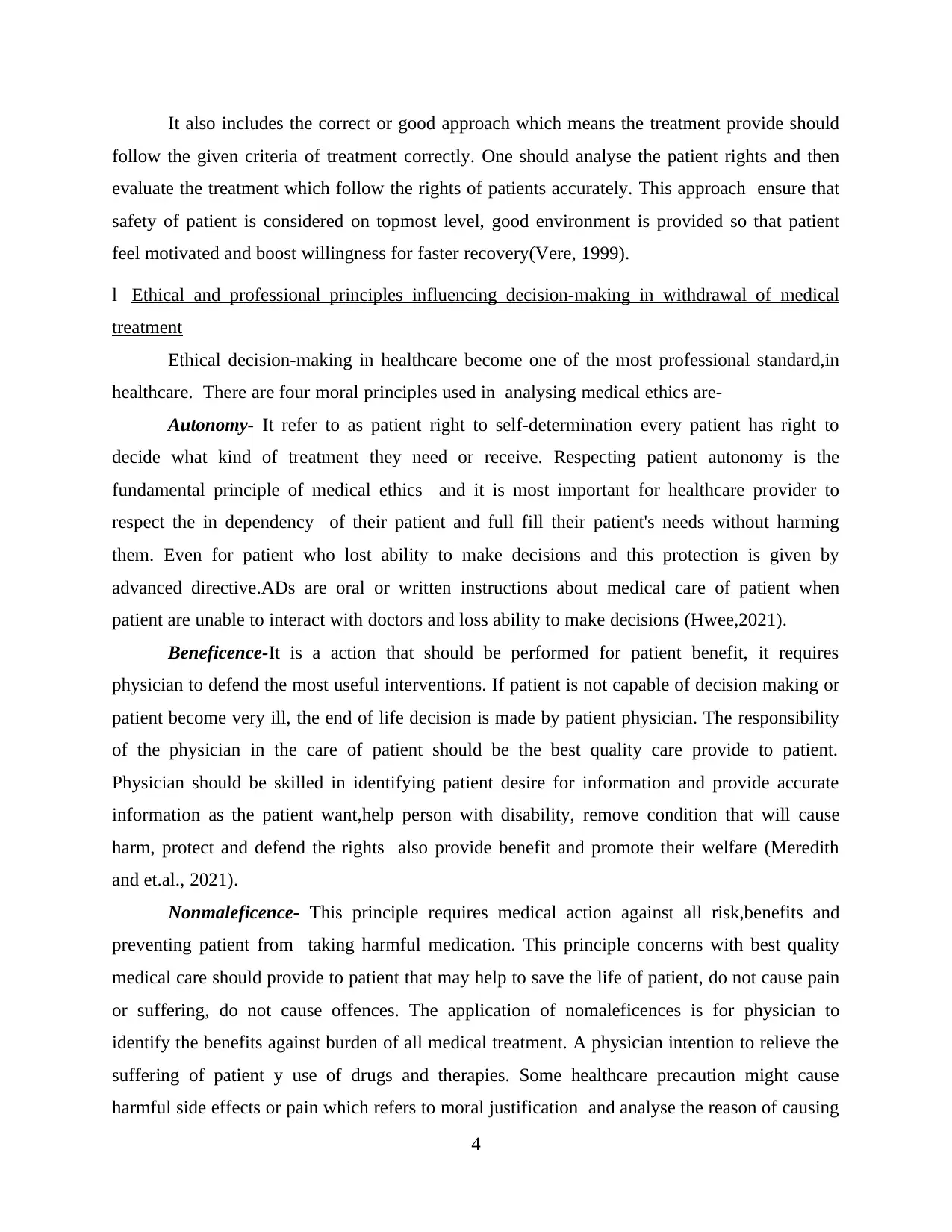
It also includes the correct or good approach which means the treatment provide should
follow the given criteria of treatment correctly. One should analyse the patient rights and then
evaluate the treatment which follow the rights of patients accurately. This approach ensure that
safety of patient is considered on topmost level, good environment is provided so that patient
feel motivated and boost willingness for faster recovery(Vere, 1999).
l壱Ethical and professional principles influencing decision-making in withdrawal of medical
treatment
Ethical decision-making in healthcare become one of the most professional standard,in
healthcare. There are four moral principles used in analysing medical ethics are-
Autonomy- It refer to as patient right to self-determination every patient has right to
decide what kind of treatment they need or receive. Respecting patient autonomy is the
fundamental principle of medical ethics and it is most important for healthcare provider to
respect the in dependency of their patient and full fill their patient's needs without harming
them. Even for patient who lost ability to make decisions and this protection is given by
advanced directive.ADs are oral or written instructions about medical care of patient when
patient are unable to interact with doctors and loss ability to make decisions (Hwee,2021).
Beneficence-It is a action that should be performed for patient benefit, it requires
physician to defend the most useful interventions. If patient is not capable of decision making or
patient become very ill, the end of life decision is made by patient physician. The responsibility
of the physician in the care of patient should be the best quality care provide to patient.
Physician should be skilled in identifying patient desire for information and provide accurate
information as the patient want,help person with disability, remove condition that will cause
harm, protect and defend the rights also provide benefit and promote their welfare (Meredith
and et.al., 2021).
Nonmaleficence- This principle requires medical action against all risk,benefits and
preventing patient from taking harmful medication. This principle concerns with best quality
medical care should provide to patient that may help to save the life of patient, do not cause pain
or suffering, do not cause offences. The application of nomaleficences is for physician to
identify the benefits against burden of all medical treatment. A physician intention to relieve the
suffering of patient y use of drugs and therapies. Some healthcare precaution might cause
harmful side effects or pain which refers to moral justification and analyse the reason of causing
4
follow the given criteria of treatment correctly. One should analyse the patient rights and then
evaluate the treatment which follow the rights of patients accurately. This approach ensure that
safety of patient is considered on topmost level, good environment is provided so that patient
feel motivated and boost willingness for faster recovery(Vere, 1999).
l壱Ethical and professional principles influencing decision-making in withdrawal of medical
treatment
Ethical decision-making in healthcare become one of the most professional standard,in
healthcare. There are four moral principles used in analysing medical ethics are-
Autonomy- It refer to as patient right to self-determination every patient has right to
decide what kind of treatment they need or receive. Respecting patient autonomy is the
fundamental principle of medical ethics and it is most important for healthcare provider to
respect the in dependency of their patient and full fill their patient's needs without harming
them. Even for patient who lost ability to make decisions and this protection is given by
advanced directive.ADs are oral or written instructions about medical care of patient when
patient are unable to interact with doctors and loss ability to make decisions (Hwee,2021).
Beneficence-It is a action that should be performed for patient benefit, it requires
physician to defend the most useful interventions. If patient is not capable of decision making or
patient become very ill, the end of life decision is made by patient physician. The responsibility
of the physician in the care of patient should be the best quality care provide to patient.
Physician should be skilled in identifying patient desire for information and provide accurate
information as the patient want,help person with disability, remove condition that will cause
harm, protect and defend the rights also provide benefit and promote their welfare (Meredith
and et.al., 2021).
Nonmaleficence- This principle requires medical action against all risk,benefits and
preventing patient from taking harmful medication. This principle concerns with best quality
medical care should provide to patient that may help to save the life of patient, do not cause pain
or suffering, do not cause offences. The application of nomaleficences is for physician to
identify the benefits against burden of all medical treatment. A physician intention to relieve the
suffering of patient y use of drugs and therapies. Some healthcare precaution might cause
harmful side effects or pain which refers to moral justification and analyse the reason of causing
4
⊘ This is a preview!⊘
Do you want full access?
Subscribe today to unlock all pages.

Trusted by 1+ million students worldwide
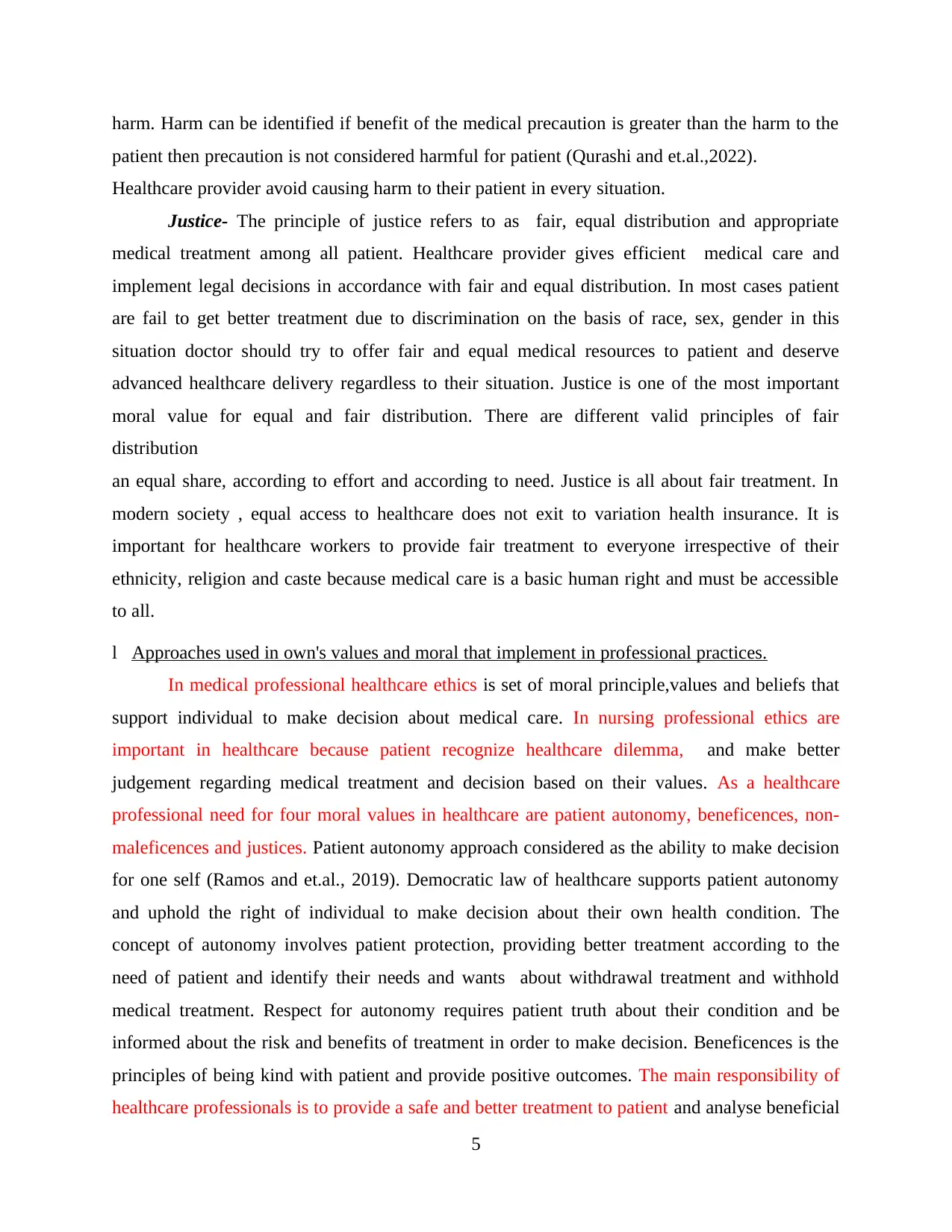
harm. Harm can be identified if benefit of the medical precaution is greater than the harm to the
patient then precaution is not considered harmful for patient (Qurashi and et.al.,2022).
Healthcare provider avoid causing harm to their patient in every situation.
Justice- The principle of justice refers to as fair, equal distribution and appropriate
medical treatment among all patient. Healthcare provider gives efficient medical care and
implement legal decisions in accordance with fair and equal distribution. In most cases patient
are fail to get better treatment due to discrimination on the basis of race, sex, gender in this
situation doctor should try to offer fair and equal medical resources to patient and deserve
advanced healthcare delivery regardless to their situation. Justice is one of the most important
moral value for equal and fair distribution. There are different valid principles of fair
distribution
an equal share, according to effort and according to need. Justice is all about fair treatment. In
modern society , equal access to healthcare does not exit to variation health insurance. It is
important for healthcare workers to provide fair treatment to everyone irrespective of their
ethnicity, religion and caste because medical care is a basic human right and must be accessible
to all.
l壱Approaches used in own's values and moral that implement in professional practices.
In medical professional healthcare ethics is set of moral principle,values and beliefs that
support individual to make decision about medical care. In nursing professional ethics are
important in healthcare because patient recognize healthcare dilemma, and make better
judgement regarding medical treatment and decision based on their values. As a healthcare
professional need for four moral values in healthcare are patient autonomy, beneficences, non-
maleficences and justices. Patient autonomy approach considered as the ability to make decision
for one self (Ramos and et.al., 2019). Democratic law of healthcare supports patient autonomy
and uphold the right of individual to make decision about their own health condition. The
concept of autonomy involves patient protection, providing better treatment according to the
need of patient and identify their needs and wants about withdrawal treatment and withhold
medical treatment. Respect for autonomy requires patient truth about their condition and be
informed about the risk and benefits of treatment in order to make decision. Beneficences is the
principles of being kind with patient and provide positive outcomes. The main responsibility of
healthcare professionals is to provide a safe and better treatment to patient and analyse beneficial
5
patient then precaution is not considered harmful for patient (Qurashi and et.al.,2022).
Healthcare provider avoid causing harm to their patient in every situation.
Justice- The principle of justice refers to as fair, equal distribution and appropriate
medical treatment among all patient. Healthcare provider gives efficient medical care and
implement legal decisions in accordance with fair and equal distribution. In most cases patient
are fail to get better treatment due to discrimination on the basis of race, sex, gender in this
situation doctor should try to offer fair and equal medical resources to patient and deserve
advanced healthcare delivery regardless to their situation. Justice is one of the most important
moral value for equal and fair distribution. There are different valid principles of fair
distribution
an equal share, according to effort and according to need. Justice is all about fair treatment. In
modern society , equal access to healthcare does not exit to variation health insurance. It is
important for healthcare workers to provide fair treatment to everyone irrespective of their
ethnicity, religion and caste because medical care is a basic human right and must be accessible
to all.
l壱Approaches used in own's values and moral that implement in professional practices.
In medical professional healthcare ethics is set of moral principle,values and beliefs that
support individual to make decision about medical care. In nursing professional ethics are
important in healthcare because patient recognize healthcare dilemma, and make better
judgement regarding medical treatment and decision based on their values. As a healthcare
professional need for four moral values in healthcare are patient autonomy, beneficences, non-
maleficences and justices. Patient autonomy approach considered as the ability to make decision
for one self (Ramos and et.al., 2019). Democratic law of healthcare supports patient autonomy
and uphold the right of individual to make decision about their own health condition. The
concept of autonomy involves patient protection, providing better treatment according to the
need of patient and identify their needs and wants about withdrawal treatment and withhold
medical treatment. Respect for autonomy requires patient truth about their condition and be
informed about the risk and benefits of treatment in order to make decision. Beneficences is the
principles of being kind with patient and provide positive outcomes. The main responsibility of
healthcare professionals is to provide a safe and better treatment to patient and analyse beneficial
5
Paraphrase This Document
Need a fresh take? Get an instant paraphrase of this document with our AI Paraphraser
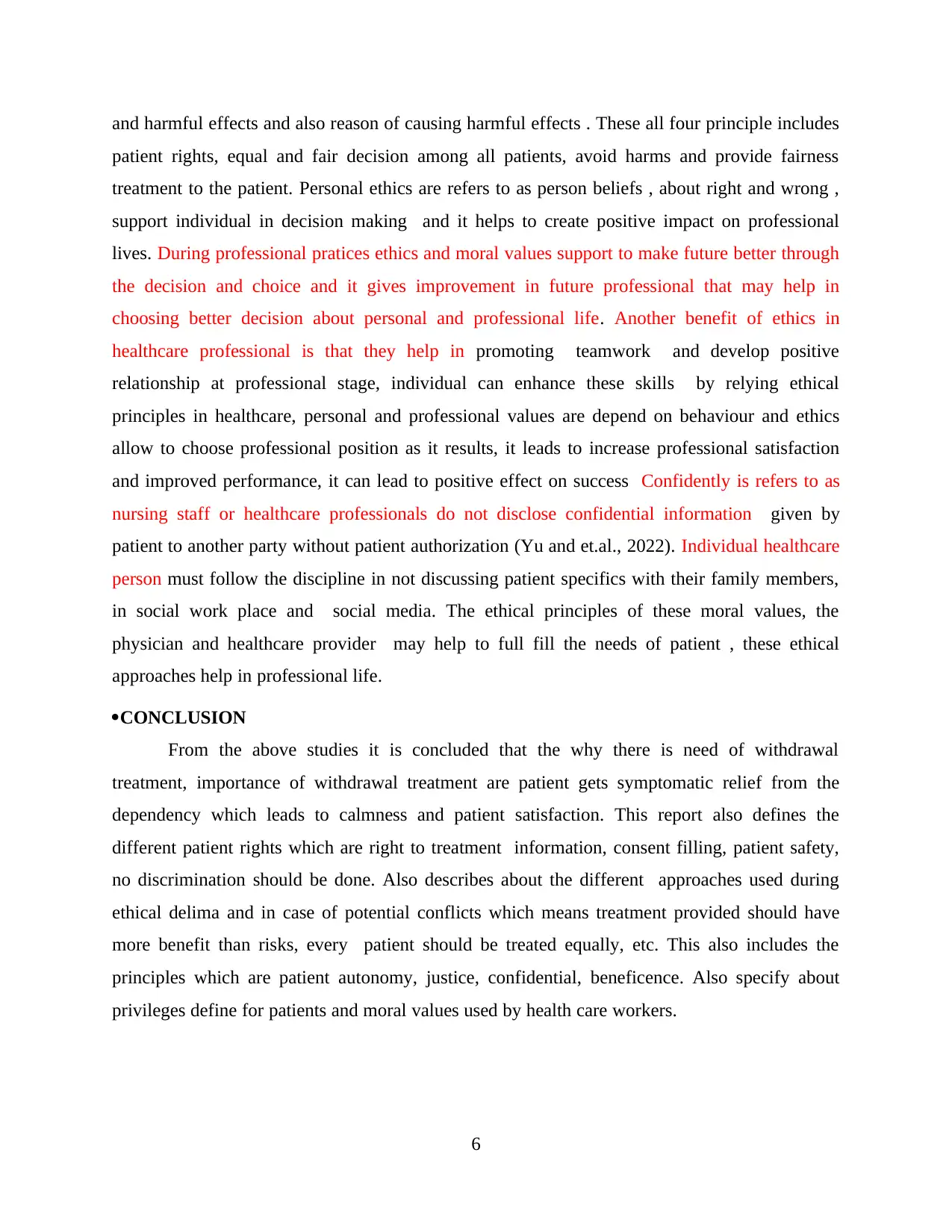
and harmful effects and also reason of causing harmful effects . These all four principle includes
patient rights, equal and fair decision among all patients, avoid harms and provide fairness
treatment to the patient. Personal ethics are refers to as person beliefs , about right and wrong ,
support individual in decision making and it helps to create positive impact on professional
lives. During professional pratices ethics and moral values support to make future better through
the decision and choice and it gives improvement in future professional that may help in
choosing better decision about personal and professional life. Another benefit of ethics in
healthcare professional is that they help in promoting teamwork and develop positive
relationship at professional stage, individual can enhance these skills by relying ethical
principles in healthcare, personal and professional values are depend on behaviour and ethics
allow to choose professional position as it results, it leads to increase professional satisfaction
and improved performance, it can lead to positive effect on success Confidently is refers to as
nursing staff or healthcare professionals do not disclose confidential information given by
patient to another party without patient authorization (Yu and et.al., 2022). Individual healthcare
person must follow the discipline in not discussing patient specifics with their family members,
in social work place and social media. The ethical principles of these moral values, the
physician and healthcare provider may help to full fill the needs of patient , these ethical
approaches help in professional life.
·CONCLUSION
From the above studies it is concluded that the why there is need of withdrawal
treatment, importance of withdrawal treatment are patient gets symptomatic relief from the
dependency which leads to calmness and patient satisfaction. This report also defines the
different patient rights which are right to treatment information, consent filling, patient safety,
no discrimination should be done. Also describes about the different approaches used during
ethical delima and in case of potential conflicts which means treatment provided should have
more benefit than risks, every patient should be treated equally, etc. This also includes the
principles which are patient autonomy, justice, confidential, beneficence. Also specify about
privileges define for patients and moral values used by health care workers.
6
patient rights, equal and fair decision among all patients, avoid harms and provide fairness
treatment to the patient. Personal ethics are refers to as person beliefs , about right and wrong ,
support individual in decision making and it helps to create positive impact on professional
lives. During professional pratices ethics and moral values support to make future better through
the decision and choice and it gives improvement in future professional that may help in
choosing better decision about personal and professional life. Another benefit of ethics in
healthcare professional is that they help in promoting teamwork and develop positive
relationship at professional stage, individual can enhance these skills by relying ethical
principles in healthcare, personal and professional values are depend on behaviour and ethics
allow to choose professional position as it results, it leads to increase professional satisfaction
and improved performance, it can lead to positive effect on success Confidently is refers to as
nursing staff or healthcare professionals do not disclose confidential information given by
patient to another party without patient authorization (Yu and et.al., 2022). Individual healthcare
person must follow the discipline in not discussing patient specifics with their family members,
in social work place and social media. The ethical principles of these moral values, the
physician and healthcare provider may help to full fill the needs of patient , these ethical
approaches help in professional life.
·CONCLUSION
From the above studies it is concluded that the why there is need of withdrawal
treatment, importance of withdrawal treatment are patient gets symptomatic relief from the
dependency which leads to calmness and patient satisfaction. This report also defines the
different patient rights which are right to treatment information, consent filling, patient safety,
no discrimination should be done. Also describes about the different approaches used during
ethical delima and in case of potential conflicts which means treatment provided should have
more benefit than risks, every patient should be treated equally, etc. This also includes the
principles which are patient autonomy, justice, confidential, beneficence. Also specify about
privileges define for patients and moral values used by health care workers.
6
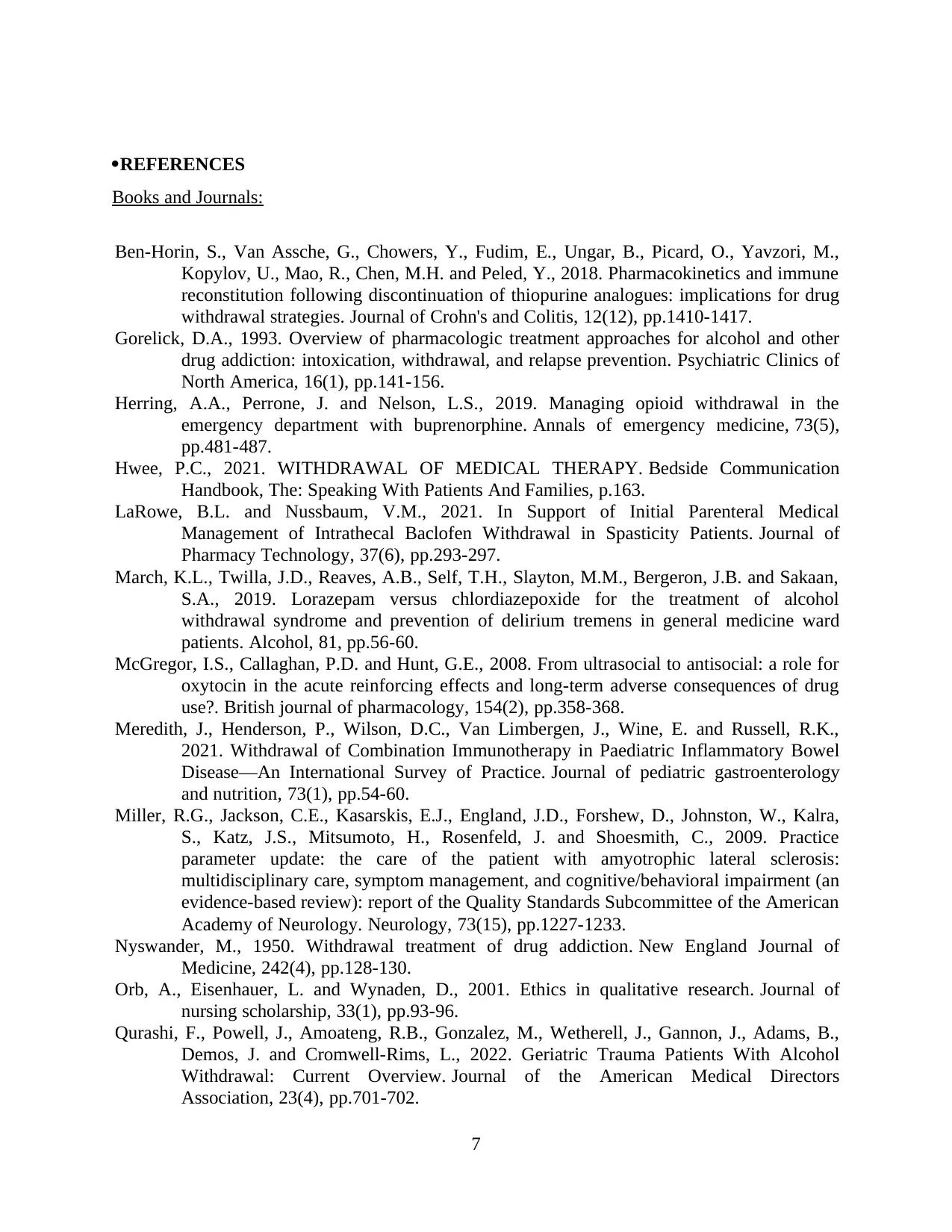
·REFERENCES
Books and Journals:
Ben-Horin, S., Van Assche, G., Chowers, Y., Fudim, E., Ungar, B., Picard, O., Yavzori, M.,
Kopylov, U., Mao, R., Chen, M.H. and Peled, Y., 2018. Pharmacokinetics and immune
reconstitution following discontinuation of thiopurine analogues: implications for drug
withdrawal strategies. Journal of Crohn's and Colitis, 12(12), pp.1410-1417.
Gorelick, D.A., 1993. Overview of pharmacologic treatment approaches for alcohol and other
drug addiction: intoxication, withdrawal, and relapse prevention. Psychiatric Clinics of
North America, 16(1), pp.141-156.
Herring, A.A., Perrone, J. and Nelson, L.S., 2019. Managing opioid withdrawal in the
emergency department with buprenorphine. Annals of emergency medicine, 73(5),
pp.481-487.
Hwee, P.C., 2021. WITHDRAWAL OF MEDICAL THERAPY. Bedside Communication
Handbook, The: Speaking With Patients And Families, p.163.
LaRowe, B.L. and Nussbaum, V.M., 2021. In Support of Initial Parenteral Medical
Management of Intrathecal Baclofen Withdrawal in Spasticity Patients. Journal of
Pharmacy Technology, 37(6), pp.293-297.
March, K.L., Twilla, J.D., Reaves, A.B., Self, T.H., Slayton, M.M., Bergeron, J.B. and Sakaan,
S.A., 2019. Lorazepam versus chlordiazepoxide for the treatment of alcohol
withdrawal syndrome and prevention of delirium tremens in general medicine ward
patients. Alcohol, 81, pp.56-60.
McGregor, I.S., Callaghan, P.D. and Hunt, G.E., 2008. From ultrasocial to antisocial: a role for
oxytocin in the acute reinforcing effects and long-term adverse consequences of drug
use?. British journal of pharmacology, 154(2), pp.358-368.
Meredith, J., Henderson, P., Wilson, D.C., Van Limbergen, J., Wine, E. and Russell, R.K.,
2021. Withdrawal of Combination Immunotherapy in Paediatric Inflammatory Bowel
Disease—An International Survey of Practice. Journal of pediatric gastroenterology
and nutrition, 73(1), pp.54-60.
Miller, R.G., Jackson, C.E., Kasarskis, E.J., England, J.D., Forshew, D., Johnston, W., Kalra,
S., Katz, J.S., Mitsumoto, H., Rosenfeld, J. and Shoesmith, C., 2009. Practice
parameter update: the care of the patient with amyotrophic lateral sclerosis:
multidisciplinary care, symptom management, and cognitive/behavioral impairment (an
evidence-based review): report of the Quality Standards Subcommittee of the American
Academy of Neurology. Neurology, 73(15), pp.1227-1233.
Nyswander, M., 1950. Withdrawal treatment of drug addiction. New England Journal of
Medicine, 242(4), pp.128-130.
Orb, A., Eisenhauer, L. and Wynaden, D., 2001. Ethics in qualitative research. Journal of
nursing scholarship, 33(1), pp.93-96.
Qurashi, F., Powell, J., Amoateng, R.B., Gonzalez, M., Wetherell, J., Gannon, J., Adams, B.,
Demos, J. and Cromwell-Rims, L., 2022. Geriatric Trauma Patients With Alcohol
Withdrawal: Current Overview. Journal of the American Medical Directors
Association, 23(4), pp.701-702.
7
Books and Journals:
Ben-Horin, S., Van Assche, G., Chowers, Y., Fudim, E., Ungar, B., Picard, O., Yavzori, M.,
Kopylov, U., Mao, R., Chen, M.H. and Peled, Y., 2018. Pharmacokinetics and immune
reconstitution following discontinuation of thiopurine analogues: implications for drug
withdrawal strategies. Journal of Crohn's and Colitis, 12(12), pp.1410-1417.
Gorelick, D.A., 1993. Overview of pharmacologic treatment approaches for alcohol and other
drug addiction: intoxication, withdrawal, and relapse prevention. Psychiatric Clinics of
North America, 16(1), pp.141-156.
Herring, A.A., Perrone, J. and Nelson, L.S., 2019. Managing opioid withdrawal in the
emergency department with buprenorphine. Annals of emergency medicine, 73(5),
pp.481-487.
Hwee, P.C., 2021. WITHDRAWAL OF MEDICAL THERAPY. Bedside Communication
Handbook, The: Speaking With Patients And Families, p.163.
LaRowe, B.L. and Nussbaum, V.M., 2021. In Support of Initial Parenteral Medical
Management of Intrathecal Baclofen Withdrawal in Spasticity Patients. Journal of
Pharmacy Technology, 37(6), pp.293-297.
March, K.L., Twilla, J.D., Reaves, A.B., Self, T.H., Slayton, M.M., Bergeron, J.B. and Sakaan,
S.A., 2019. Lorazepam versus chlordiazepoxide for the treatment of alcohol
withdrawal syndrome and prevention of delirium tremens in general medicine ward
patients. Alcohol, 81, pp.56-60.
McGregor, I.S., Callaghan, P.D. and Hunt, G.E., 2008. From ultrasocial to antisocial: a role for
oxytocin in the acute reinforcing effects and long-term adverse consequences of drug
use?. British journal of pharmacology, 154(2), pp.358-368.
Meredith, J., Henderson, P., Wilson, D.C., Van Limbergen, J., Wine, E. and Russell, R.K.,
2021. Withdrawal of Combination Immunotherapy in Paediatric Inflammatory Bowel
Disease—An International Survey of Practice. Journal of pediatric gastroenterology
and nutrition, 73(1), pp.54-60.
Miller, R.G., Jackson, C.E., Kasarskis, E.J., England, J.D., Forshew, D., Johnston, W., Kalra,
S., Katz, J.S., Mitsumoto, H., Rosenfeld, J. and Shoesmith, C., 2009. Practice
parameter update: the care of the patient with amyotrophic lateral sclerosis:
multidisciplinary care, symptom management, and cognitive/behavioral impairment (an
evidence-based review): report of the Quality Standards Subcommittee of the American
Academy of Neurology. Neurology, 73(15), pp.1227-1233.
Nyswander, M., 1950. Withdrawal treatment of drug addiction. New England Journal of
Medicine, 242(4), pp.128-130.
Orb, A., Eisenhauer, L. and Wynaden, D., 2001. Ethics in qualitative research. Journal of
nursing scholarship, 33(1), pp.93-96.
Qurashi, F., Powell, J., Amoateng, R.B., Gonzalez, M., Wetherell, J., Gannon, J., Adams, B.,
Demos, J. and Cromwell-Rims, L., 2022. Geriatric Trauma Patients With Alcohol
Withdrawal: Current Overview. Journal of the American Medical Directors
Association, 23(4), pp.701-702.
7
⊘ This is a preview!⊘
Do you want full access?
Subscribe today to unlock all pages.

Trusted by 1+ million students worldwide
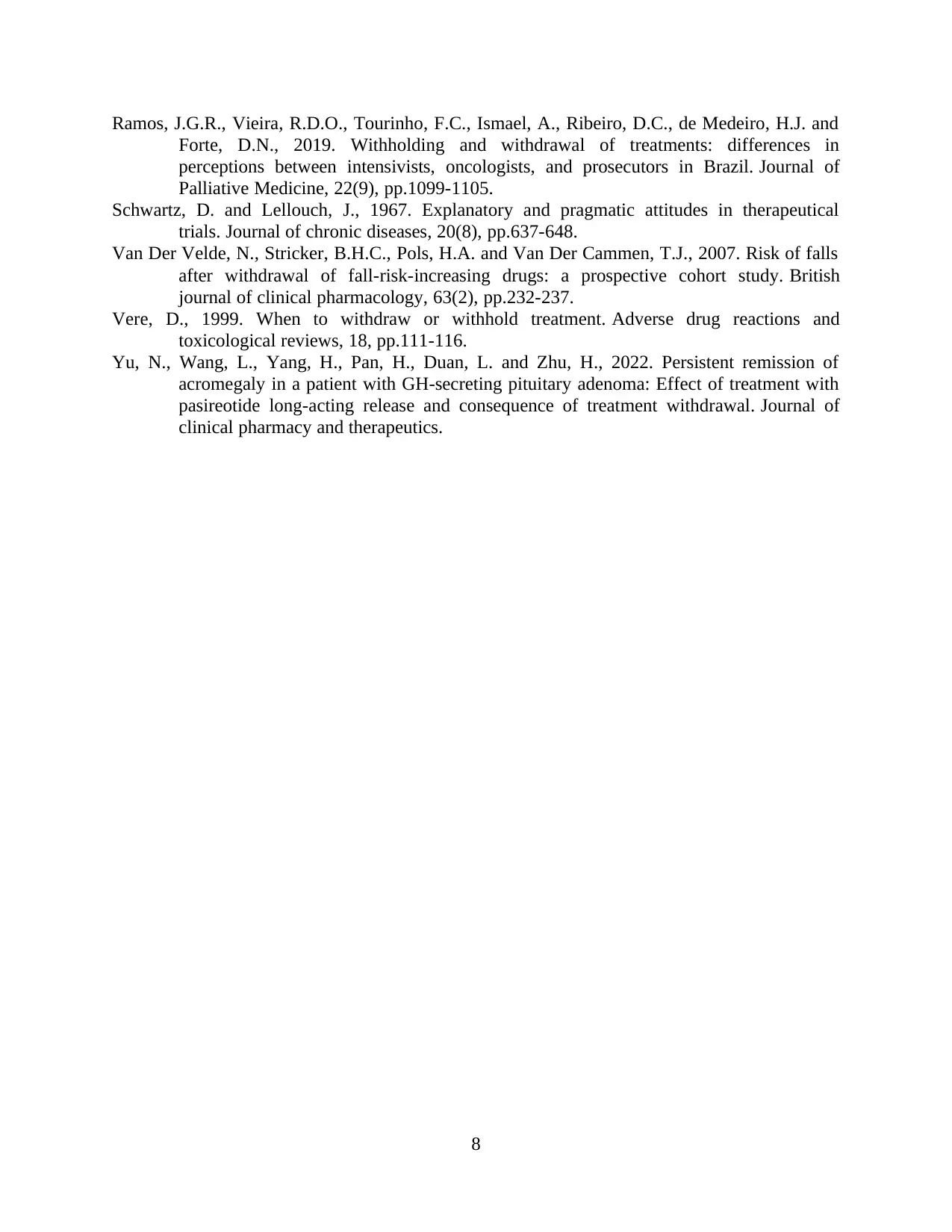
Ramos, J.G.R., Vieira, R.D.O., Tourinho, F.C., Ismael, A., Ribeiro, D.C., de Medeiro, H.J. and
Forte, D.N., 2019. Withholding and withdrawal of treatments: differences in
perceptions between intensivists, oncologists, and prosecutors in Brazil. Journal of
Palliative Medicine, 22(9), pp.1099-1105.
Schwartz, D. and Lellouch, J., 1967. Explanatory and pragmatic attitudes in therapeutical
trials. Journal of chronic diseases, 20(8), pp.637-648.
Van Der Velde, N., Stricker, B.H.C., Pols, H.A. and Van Der Cammen, T.J., 2007. Risk of falls
after withdrawal of fall-risk-increasing drugs: a prospective cohort study. British
journal of clinical pharmacology, 63(2), pp.232-237.
Vere, D., 1999. When to withdraw or withhold treatment. Adverse drug reactions and
toxicological reviews, 18, pp.111-116.
Yu, N., Wang, L., Yang, H., Pan, H., Duan, L. and Zhu, H., 2022. Persistent remission of
acromegaly in a patient with GH-secreting pituitary adenoma: Effect of treatment with
pasireotide long-acting release and consequence of treatment withdrawal. Journal of
clinical pharmacy and therapeutics.
8
Forte, D.N., 2019. Withholding and withdrawal of treatments: differences in
perceptions between intensivists, oncologists, and prosecutors in Brazil. Journal of
Palliative Medicine, 22(9), pp.1099-1105.
Schwartz, D. and Lellouch, J., 1967. Explanatory and pragmatic attitudes in therapeutical
trials. Journal of chronic diseases, 20(8), pp.637-648.
Van Der Velde, N., Stricker, B.H.C., Pols, H.A. and Van Der Cammen, T.J., 2007. Risk of falls
after withdrawal of fall-risk-increasing drugs: a prospective cohort study. British
journal of clinical pharmacology, 63(2), pp.232-237.
Vere, D., 1999. When to withdraw or withhold treatment. Adverse drug reactions and
toxicological reviews, 18, pp.111-116.
Yu, N., Wang, L., Yang, H., Pan, H., Duan, L. and Zhu, H., 2022. Persistent remission of
acromegaly in a patient with GH-secreting pituitary adenoma: Effect of treatment with
pasireotide long-acting release and consequence of treatment withdrawal. Journal of
clinical pharmacy and therapeutics.
8
1 out of 10
Related Documents
Your All-in-One AI-Powered Toolkit for Academic Success.
+13062052269
info@desklib.com
Available 24*7 on WhatsApp / Email
![[object Object]](/_next/static/media/star-bottom.7253800d.svg)
Unlock your academic potential
Copyright © 2020–2026 A2Z Services. All Rights Reserved. Developed and managed by ZUCOL.





